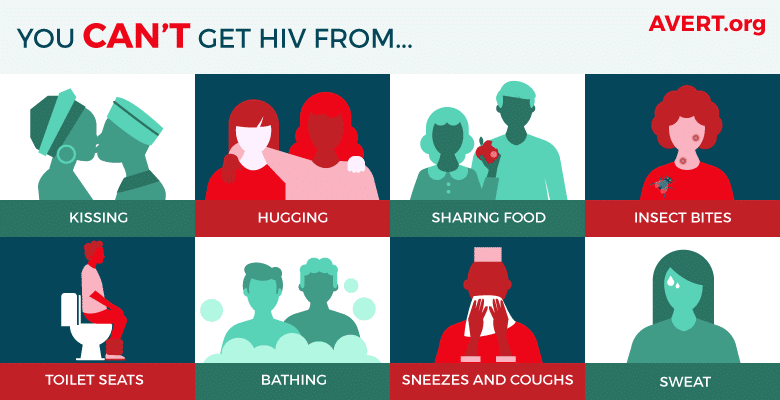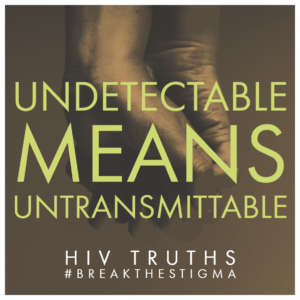
What is HIV? It’s a virus. There are many common viruses that permeate the human population. But let’s be clear that behind every virus label is a real person, just like you. This person loves, works, plays, and longs to live a life of purpose and connection. HIV is not a death sentence, not anymore. Because of advances in antiretroviral treatment (ART), people can reach such small quantities of the virus in their blood that the virus is literally “undetectable.” Undetectable means “there is zero risk of transmitting the virus to others,” states Avert.com, a leading source of up-to-date info about HIV. Let’s read that again. ZERO CHANCE. “Undetectable means untransmittable,” said Antonio succinctly, who is newly diagnosed and living in Denver. However, there is still a lot of misconception and public stigma surrounding it. But even if someone is positive for HIV and the virus is detectable it cannot be spread by hugging, kissing, sharing cups and dishes, sharing food, sharing bathroom facilities, sneezing, or coughing.
Many people living with HIV are afraid, even today, to share their HIV status with their family and friends. “I don’t even try to have relationships because it’s so hard for me to talk about it,” said Kate from Denver, who has chosen to use a pseudonym to protect her identity. Kate has lived with HIV for 30 years.

Medications are available to everyone that needs them. And the important thing to remember is that taking treatment means you can live a long and healthy life like anyone else. “It’s so treatable. It’s not a big deal at all,” said Mary from Denver. “I don’t know what the big deal is. Eventually it will be curable. You can live with it, survive, and have a good lifestyle,” said Gene from Missouri. Gene has had HIV for ten years. “It’s not as scary as people think. I’m undetectable, it’s dormant. I don’t advertise it but i don’t deny it, either. It’s just one of those things you live with.”
The annual Shadowcliff HIV Retreat is a favorite for both staff and guests. For thirty years Shadowcliff has welcomed a community of loving and courageous people to the lodge who live with HIV. “The courage here among these people is nothing like I have ever seen. This is not your everyday courage, this is something special, cultivated by decades of people coming to terms with all these things,” said Mark from Longmont, CO.
“This lodge means a lot to me, this retreat means a lot to me. The staff is so accepting and non-judgemental. I do other things that are HIV Related but this retreat is one of the best in the country,” said Guy from Denver. It’s his ninth year attending the HIV Retreat at Shadowcliff. He has also spent time volunteering on construction projects on the property. “You know how people come to The Point at Shadowcliff and throw their ashes?, well I want mine thrown there,” he said.
A lot has changed since the first Shadowcliff HIV Retreat began in 1990. Shadowcliff founders Patt and Warren Rempel started the retreat in honor of their son Scott who died of AIDS in 1989. Michael, who has been coordinating the retreat for the last 16 years said, “At first, the retreat was all gay white men who had less than a year or two to live. Over the years, it has evolved and changed just as the epidemic has evolved and changed, and now it is a positive, empowering, and inspiring experience.”
But even within the uplifting community environment of the retreat, attendees share their collective stories of loss and rejection. In 1990, Mary lost her husband to AIDS which left her a single mother with a five year old son. “When we were married he didn’t even know he had it.” One of the misconceptions about HIV is that only people who are promiscuous are affected. “I got it when I was in a committed relationship, we got tested together, and neither one of us knew we had it,” said Antonio.
“It’s really sad when you start a relationship and you get to that point where you have to say something, and you do, and it completely destroys the relationship. It’s so harmful to us, as an HIV person. It depletes our self esteem; it hurts,” said Jim from Longmont, CO, who has been “poz” since 94. “In 94 it was still a death sentence. I was devastated. But 26 years later I’m still standing, I’m still laughing!”
Mark, from Longmont, shared his optimism about his own experience with HIV, “It’s just one more journey in my life. What the HIV diagnosis did for me was make me realize that I hadn’t been living the life I needed to live. It turned me in the right direction. Whatever it is: HIV or cancer or a breakup, it’s just one more journey and if you embrace it I believe it will take you where you need to go. Don’t be afraid.”
“HIV is not who you are. Life is good. Live it each day,” Mary reminds us.